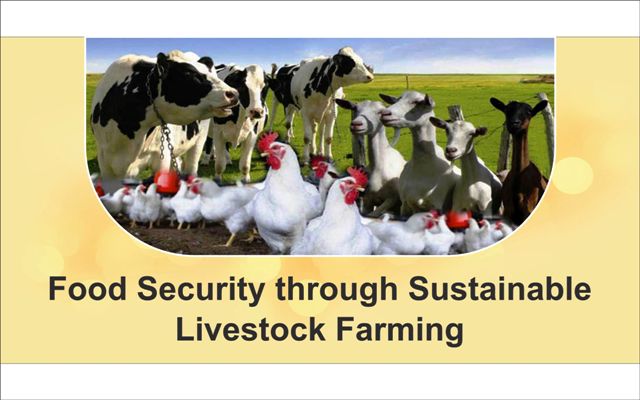Sustainable Livestock Feed Sourcing And Management
Food security is an important aspect that affects every individual's life, regardless of their background or ethnicity. It is crucial to ensure that everyone has access to nutritious and sustainable food sources. Livestock farming plays a significant role in achieving food security goals, as it provides a sustainable source of animal-based products like meat, milk, and eggs.
Livestock farming, also known as animal husbandry, refers to the rearing of animals for various purposes, such as food production and agricultural work. It involves the management and care of domestic animals, including cattle, sheep, goats, poultry, and pigs. Livestock farmers play a vital role in ensuring food security worldwide by providing a consistent supply of animal-based food products.
What is the significance of livestock farming in achieving food security? Livestock farming contributes to food security in several ways. Firstly, it provides a valuable source of high-quality protein, essential for human growth and development. Animal-based products like meat, dairy, and eggs are rich in essential amino acids, vitamins, and minerals, making them an important part of a balanced diet.
Livestock farming also contributes to sustainable agriculture. The manure produced by animals can be utilized as organic fertilizer, reducing the reliance on chemical fertilizers. Additionally, livestock farming promotes crop rotation, as animal waste can be used to fertilize grazing pastures or crop fields, leading to improved soil fertility and sustainable agricultural practices.
Ideas For supporting sustainable livestock farming:
- Promoting organic and natural feeding practices: Encouraging livestock farmers to adopt organic and natural feeding practices reduces the reliance on synthetic supplements and antibiotics.
- Investing in research and development: Supporting scientific research on livestock genetics, breeding, and optimal feeding techniques can lead to more efficient and sustainable livestock farming methods.
- Education and training for farmers: Providing education and training programs for livestock farmers can enhance their knowledge and skills, enabling them to implement sustainable practices.
- Enforcing regulations on animal welfare: Implementing and enforcing regulations to ensure the humane treatment of animals in livestock farming operations is essential for sustainability.
- Supporting local and small-scale livestock farmers: Encouraging the growth of local and small-scale livestock farming operations promotes sustainability and helps maintain biodiversity.
Recommendations For policymakers and government agencies:
- Developing comprehensive policies: Policymakers should develop and implement comprehensive policies that promote sustainable livestock farming, taking into account environmental, economic, and social factors.
- Providing financial incentives: Offering financial incentives, such as subsidies or grants, can encourage livestock farmers to adopt sustainable practices and invest in environmentally friendly infrastructure.
- Supporting research and innovation: Governments should allocate resources for research and innovation in livestock farming, creating opportunities for new technologies and practices to enhance sustainability.
Listicle of benefits of sustainable livestock farming:
- Improved food security
- Reduced environmental impact
- Enhanced soil fertility
- Promotion of biodiversity
- Support for rural economies
- Higher-quality animal-based products
- Mitigation of climate change
- Job creation
- Food waste reduction
- Resilient food production systems
Question & Answer:
Q: How does livestock farming contribute to greenhouse gas emissions?
A: Livestock farming, particularly intensive production systems, can contribute to greenhouse gas emissions. The digestion process in ruminant animals like cattle and sheep produces methane, a potent greenhouse gas. However, sustainable livestock farming practices, such as improved manure management and rotational grazing, can help mitigate these emissions.
Q: What are the potential risks of intensive livestock farming?
A: Intensive livestock farming can lead to various environmental and health risks. It can contribute to water pollution due to the excessive use of chemical fertilizers and improper waste management. Additionally, the overuse of antibiotics in intensive farming can lead to the development of antibiotic-resistant bacteria, posing a threat to human health.
Summary of the importance of sustainable livestock farming:
Sustainable livestock farming is essential for achieving food security and promoting sustainable agricultural practices. It provides a valuable source of high-quality protein and essential nutrients while minimizing the environmental impact. By supporting sustainable livestock farming through education, policies, and innovation, we can ensure a resilient and inclusive food production system for future generations.

Post a Comment for "Sustainable Livestock Feed Sourcing And Management"